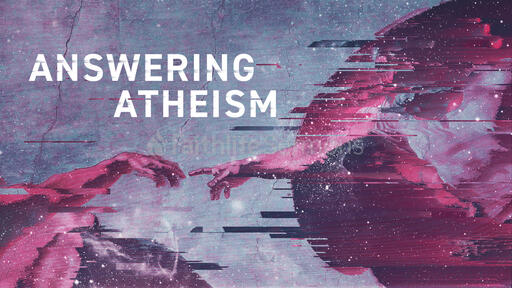Christ. Is. Risen.
Notes
Transcript
Sermon Tone Analysis
A
D
F
J
S
Emotion
A
C
T
Language
O
C
E
A
E
Social
In our study of Luke, we come to what happened early on the third day after Jesus’ crucifixion on Friday. Joseph of Arimathea, with help from Nicodemus (John’s Gospel), had taken down the dead body of Jesus and quickly prepared it for burial in his own new tomb in a garden outside the city and near the site of crucifixion. The women who had been faithful followers of Jesus witnessed all these things, and desired also to help prepare his body further, but because the Sabbath began at dusk on Friday evening, they rested according to God’s commandment on the Sabbath. And then came Sunday morning, and where we will pick up the narrative as it follows what these women experienced when they went back to anoint the dead body of Jesus.
What we look at today will raise some important questions. To prepare us for reading and studying this text, I’ll begin with this one:
Why was the tomb empty, and why does it matter?
Theologically, Jesus’ resurrection is central.
The resurrection of Jesus Christ is that central moment in human history that serves as the foundational doctrine of Christianity. After having truly assumed human nature and submitted to an agonizing and shameful public death, the eternal Son of God was truly raised from the dead in his glorified physical body, no longer subject to decay and death. His resurrection validates his identity as the divine Son of God, demonstrates his irrevocable victory over death and the grave, and secures both the present salvation and future physical resurrection of believers. (Lexham Survey of Theology)
To be most precise, the foundational doctrine of Christianity isn’t the resurrection itself but the resurrected Lord. Jesus Christ the Lord is the foundation.
But if the resurrection of Jesus is theologically central to who are are as Christians, let me ask another pertinent question:
INTRO: Is Christianity intellectually honest, and does it matter?
INTRO: Is Christianity intellectually honest, and does it matter?
Yes, it is and it must be. It is intellectually honest and it must be intellectually honest.
It is God who created us with the capacity to reason. To observe and to interpret what we observe, to grow in knowledge, to reason.
In fact, the Apostle Paul explains that what holds man accountable before God, even if we have never heard about Jesus specifically, is that by this God-given intellectual capacity we should be able to observe and reason that there is in fact a God to whom we should respond:
For his invisible attributes, namely, his eternal power and divine nature, have been clearly perceived, ever since the creation of the world, in the things that have been made. So they are without excuse. For although they knew God, they did not honor him as God or give thanks to him, but they became futile in their thinking, and their foolish hearts were darkened.
[comment also on vv. 22-25, and 28, 32] In other words, it is in fact intellectually dishonest to ignore the plain evidence of the existence of God.
Yes, Christianity is the most intellectual honest explanation for what exists and what occurs in our experience of that existence.
Faith is not a blind leap into unverifiable wishful thinking. Faith is a step of trusting submission based on very reasonable evidence that God has supplied concerning himself and his plan and promises.
Intellectual integrity is therefore extremely important.
I believe that this is a good description of the endeavor and devotion of Christian apologists. They seek to establish the intellectual integrity of the Christian faith against slanderous accusations from atheists and agnostics, to defend things such as historicity, reliability, and reasonability (and in so doing reveal such slander as motivated by a priori rejection of God’s existence and authority, or any authority beyond one’s own self-actualization).
So, is it important to establish the evidence for the resurrection of Jesus Christ? The gospel writers seem to think so, and Luke is no exception.
Let’s read Luke’s account of what happened on that Sunday morning after Jesus’ death (and the next day of Sabbath rest), as it happened.
But on the first day of the week, at early dawn, they went to the tomb, taking the spices they had prepared. And they found the stone rolled away from the tomb, but when they went in they did not find the body of the Lord Jesus. While they were perplexed about this, behold, two men stood by them in dazzling apparel. And as they were frightened and bowed their faces to the ground, the men said to them, “Why do you seek the living among the dead? He is not here, but has risen. Remember how he told you, while he was still in Galilee, that the Son of Man must be delivered into the hands of sinful men and be crucified and on the third day rise.” And they remembered his words, and returning from the tomb they told all these things to the eleven and to all the rest. Now it was Mary Magdalene and Joanna and Mary the mother of James and the other women with them who told these things to the apostles, but these words seemed to them an idle tale, and they did not believe them. But Peter rose and ran to the tomb; stooping and looking in, he saw the linen cloths by themselves; and he went home marveling at what had happened.
I’ve written a series of questions that might help us to solidify for ourselves what I think Luke is getting at.
Why were the women going to the tomb? (v. 1)
Why were the women going to the tomb? (v. 1)
To anoint the dead body of Jesus (Mk 16:1)
Why was the stone rolled away? (v. 2)
Why was the stone rolled away? (v. 2)
According the Mark, the women even wondered on the way how they would get into the tomb bc of the heavy stone. Mk 16:3
So that they (the women and others—Peter, John, etc.) could verify that the tomb was empty. Not so Jesus could get out, but so the witnesses could get in.
Luke doesn’t tell us “how” it happened, but Matthew does. And this occured prior to the women’s arrival.
And behold, there was a great earthquake, for an angel of the Lord descended from heaven and came and rolled back the stone and sat on it. His appearance was like lightning, and his clothing white as snow. And for fear of him the guards trembled and became like dead men.
Why was the tomb empty? (vv. 3 & 6)
Why was the tomb empty? (vv. 3 & 6)
Why didn’t they find the body of Jesus? (which they fully expected to find there)
Christ is risen.
Why were two angels present? (v. 4)
Why were two angels present? (v. 4)
As witnesses from God that Jesus was risen. (not stolen body)
Why was there a rebuke in the angels words? (vv. 5-6)
Why was there a rebuke in the angels words? (vv. 5-6)
Bc Jesus had predicted his resurrection. Here’s the specific one while he was still in Galilee: (not the only time, either - cf. Lk 9:44, Lk 18:32-33)
saying, “The Son of Man must suffer many things and be rejected by the elders and chief priests and scribes, and be killed, and on the third day be raised.”
Why did Jesus predict his resurrection? (vv. 7-8)
Why did Jesus predict his resurrection? (vv. 7-8)
To prove that this was God’s plan, and that he is who he claimed to be.
The Lord Jesus Christ, the second person of the Godhead, has power and authority to keep his promises. … God keeps his promises.
Why did the women report what they had seen and heard? (vv. 9-10)
Why did the women report what they had seen and heard? (vv. 9-10)
Bc they were told to do so and motivated to do so. The angel speaking had told them to (Mt. 28:7) go and tell his disciples. But also undoubtedly bc they were at least beginning to believe that it was true. (Not only was the tomb empty, but an angel was there to announce its meaning.)
Furthermore, it is evident from the accounts that this same morning Jesus appeared to Mary Magdalene and to others among these women. The first physical appearances of the resurrected Jesus were to these women, most likely before they (as a group) even got back to report these things to the various disciples.
It’s here at this point where we ourselves once again must exercise intellectual integrity and provide plausible explanations for how the chronology of these resurrection morning events can be reconciled. (especially btwn Matthew and John… But if you read all the accounts together in one sitting, you’ll see that there is some reconciling that needs to take place—the first section of each of these chapters Mt 28, Mk 16, Lk 24, Jn 20)
Although reconciling the chronology (what exactly happened in what order) of the accounts can be done in more than one way, we should admit up front that none of them is perfectly clean and simple with the information we are given. In each case, we are forced to speculate about a couple of details that might help resolve apparent issues. (So while we can’t be dogmatic that there’s only one way to show the accounts as complimentary, we can actually see pretty readily, with intellectual honesty, that there are good plausible explanations.)
However, it is important to provide examples of reconciling the gospel accounts that shows them to be complementary instead of contradictory.
My preferred explanation presumes two things: Mary Magdalene left the tomb immediately upon finding it empty, and without going inside and hearing the angelic announcement, to go and tell Peter and John. Secondly, it presumes (reasonably, I think) that the disciples were not all gathered in one place… not all staying in the same location, but instead gather later in the evening (cf. Lk 24:33) because of the reports being circulated amongst them this whole day.
[I’ve attached links at the bottom to a couple of suggested reconciliations that I think are very plausible explanations.]
Why did the apostles respond with incredulity? (v. 11)
Why did the apostles respond with incredulity? (v. 11)
Bc they knew the body of Jesus was dead-dead. Bc they hadn’t understood his prediction. Bc they were disillusioned about messianic kingdom expectations. Bc they (Jews) understood resurrection references primarily in light of the final resurrection (Daniel 12:1-3). Bc they were feeble in faith and prone to doubt.
Why did Peter run to the tomb and respond with amazement? (v. 12)
Why did Peter run to the tomb and respond with amazement? (v. 12)
Almost certainly bc both fear and hope welled up inside him, and he needed confirmation. Were the women telling the truth? If so, did it mean what the angels had said it meant? Would they see the risen Jesus? Would he now bring his kingdom?
We learn in v. 34 that Jesus had also appeared to Simon (Peter) that same day.
CONCLUSION: Why does Luke report the unflattering circumstances of these initial responses to the resurrection?
CONCLUSION: Why does Luke report the unflattering circumstances of these initial responses to the resurrection?
Bc it’s how it happened. This is the unpolished mark of authenticity, of veracity. Luke’s goal is to report the resurrection of Jesus as a historical event. Therefore the response of his disciples is related as it actually happened.
Whether or not the resurrection happened matters and great deal, and whether or not we are convinced of it and able to explain that it happened matters.
Paul explains in 1 Cor. 15 just how important Jesus resurrection is to us, but stating it negatively to make a point against false teachers who are claiming that a future resurrection is implausible:
And if Christ has not been raised, then our preaching is in vain and your faith is in vain.
[If time allows, read 15:12-20.] “But Christ has indeed been raised from the dead…!” or “But in fact Christ has been raised from the dead...” (1 Cor. 15:20)
It is Peter who tells us that our behavior and our defense (apologia) must be made in a way that honors God,
But even if you should suffer for righteousness’ sake, you will be blessed. Have no fear of them, nor be troubled, but in your hearts honor Christ the Lord as holy, always being prepared to make a defense to anyone who asks you for a reason for the hope that is in you; yet do it with gentleness and respect, having a good conscience, so that, when you are slandered, those who revile your good behavior in Christ may be put to shame.
Here’s the whole point of all of this. When we come to Luke’s description of the events of the Sunday morning that changes everything, we are reading the account recorded with straightforward intellectual honesty about what took place. We do well to… yes, celebrate the resurrection of our Lord… but to also follow the example of intellectual honesty from Luke (and Paul & Peter) to strengthen our own faith and to remove implausibility as an obstacle for those who continue in their rebellion against God.
So besides the application that I pray your faith is being strengthened today by this, but also therefore: We do ourselves and our young followers an injustice by not handling difficulties and doubts with intellectual integrity that seeks to honor God and bolster our faith.
Yes, it is perfectly reasonable to believe Jesus Christ rose from the dead. In fact, it is the most plausible explanation for the birth of Christianity and everything that followed.
Christ is risen, right? Right.
A couple simple online resources that offer plausible reconciliations of the reports and appearances after the resurrection:
https://answersingenesis.org/jesus/resurrection/christs-resurrection-four-accounts-one-reality/
http://www.christianlandmark.com/wp-content/uploads/2015/04/CHART-POST-RESURRECTION-APPEARANCES.pdf




